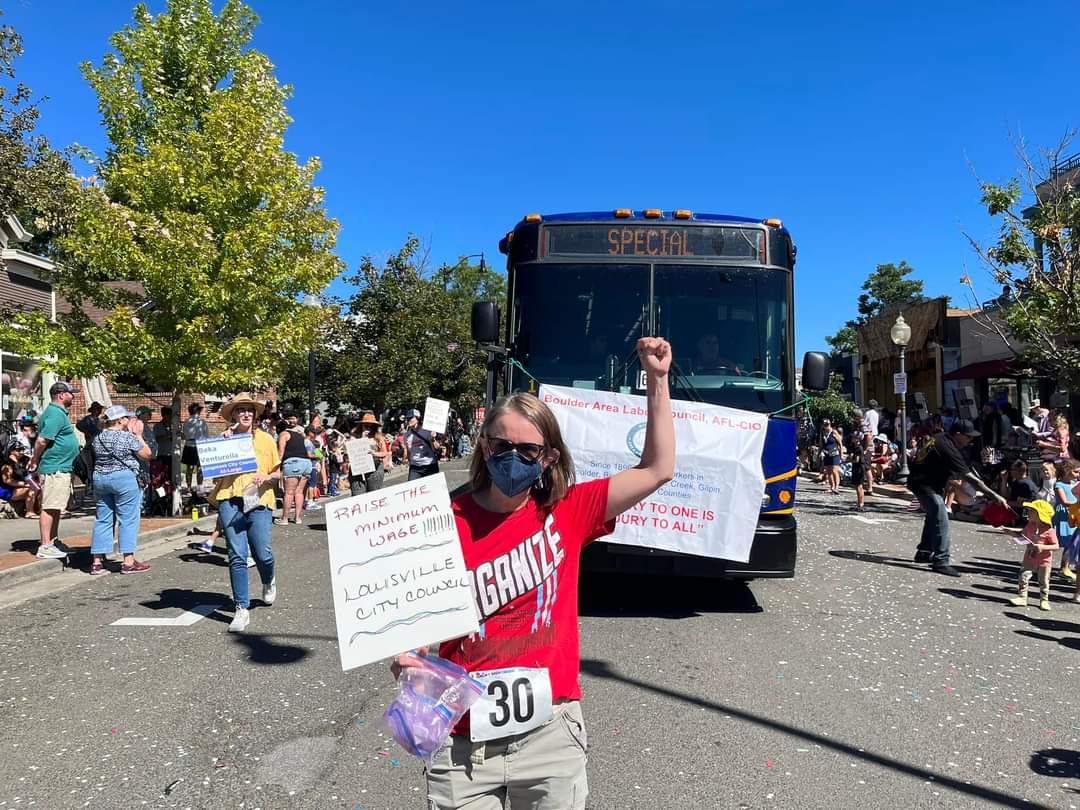
Last year was a historically good year for the labor movement as unions won big pay increases and better working conditions. The victories came after strikes and threats of strikes swept the nation. Machinists, nurses, teachers, actors, baristas, hotel housekeepers and auto workers walked off the job.
In our neck of the woods, the Boulder Area Labor Council (BALC) just elected a new president,

Alejandra Beatty, a 53-year-old retired chapter leader of Alphabet Workers Union (AWU), which she helped found. Beatty worked in tech for 25 years. She was a technical program manager at Alphabet healthcare subsidiary Verily.
Alphabet is a U.S. multinational technology conglomerate holding company headquartered in Mountain View, Calif. It was created through a restructuring of Google and became the parent company of Google and several former Google subsidiaries.
Given her background, Beatty is interested in building unions in Boulder’s emerging quantum technology industry, for skilled trade workers such as electricians and pipefitters, as well as folks with advanced degrees. Colorado was recently picked as an official U.S. Tech Hub. That designation comes with a federal grant and a stipulation for union involvement.
As the president of BALC, Beatty has a lot on her plate. The council is a part of AFL-CIO, the nation’s largest federation of unions. BALC covers six counties: Boulder, Broomfield, Clear Creek, Summit, Lake and Gilpin.
Our area doesn’t have a reputation for labor militancy, but Beatty assures me that there’s “a lot of under the surface bubbling of discontent. We aren’t that unique.”
In the past year, she was a leader in the campaign to increase the minimum wage in Boulder County. Beatty will continue pushing that.
She is concerned about creating union jobs in new local housing developments. She said they need to support “labor champions in local and state offices.”
In 2022, Beatty got some national media attention as the AWU spokesperson protesting Google policies after the U.S. Supreme Court overturned Roe v. Wade, which guaranteed a constitutional right to an abortion. Immediately after the decision, a number of major U.S. companies, including Google, announced that they would cover travel costs for employees who seek abortions outside their home state. Google also offered to provide relocation support for employees to move to states where abortion isn’t criminalized.
Beatty spoke for more than 650 Google workers who signed a petition demanding the company protect the location and browser history of people searching for content and information on abortion from law enforcement agencies and to stop donating to politicians who supported the overturning of Roe. The petition also demanded the company block ads that direct users to so-called “crisis pregnancy centers” (run by anti-abortion activists) that don’t offer any medical care but provide false and misleading information about reproductive health. The petition also demanded that Google extend its abortion benefits to so-called “contractors” who make up about half of the company’s workforce.
The campaign had “ambitious goals, many of which are still not realized today, unfortunately,” Beatty told me via email. “While there was enough public pressure applied to get Google to finally deal with the fake abortion clinics showing up in search results, there are still thousands of their employees who are not offered reimbursement should they need to seek out-of-state services related to reproductive healthcare. Because they are not full-time Googlers and instead employed by the vast contracting agency network Google has developed over many years. For many of these workers (typically called TVCs, Temps/Vendors/Contractors) they also disproportionately live in the very states where abortion bans still exist today.”
Max Zahn of ABC News found that this campaign is unique to American unions that have traditionally stuck to wages and working conditions:
“The confrontation between workers and management at one of the world’s largest tech companies sits at the convergence of several hot button issues: abortion access, content moderation online and the growing militancy of employees amid a surge of labor organizing nationwide.”
Historian Nelson Lichtenstein told Zahn that this is a “new labor movement” where “workers feel that it’s their due to have a say in what’s going on. … Workers can come together and make demands on their company on any issue — it doesn’t have to be a wage question or bread and butter.”
That may sound dangerous, but only if you are scared of democracy. Not surprisingly, Beatty is a democratic socialist.
This opinion does not necessarily reflect the views of Boulder Weekly.
Got a different take? Email letters@boulderweekly.com
